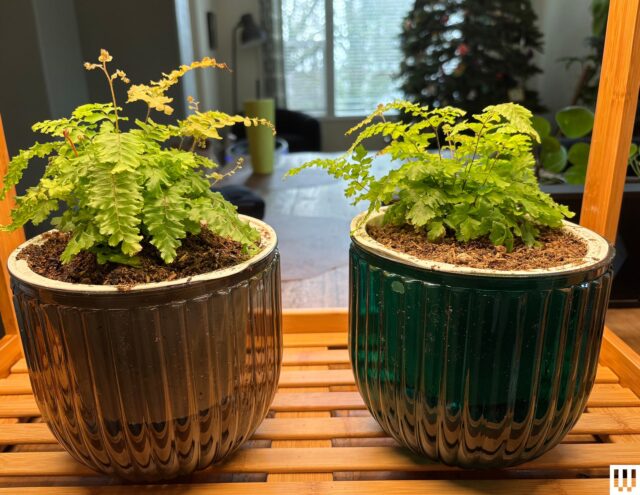“Which one is which?” my husband asked, peering at the side-by-side maidenhair ferns in 6.5-inch pots I’d left on the dining room table. One had been planted in regular hardware store potting soil, the other in a mixture of potting soil and compost made from the previous month’s kitchen scraps. “The one on the left,” I said, gesturing to the shorter, yet visibly fuller, fern. It wasn’t hugely larger than the other one, but it did look healthier.
The size of this victory depends on one’s experience with the compost process—and in-home electric composters—in general. While throwing excess food outside in a pile and letting it decompose naturally is older than … well … dirt, countertop solutions designed for kitchens have been growing in popularity the past decade or so. Which is no surprise given that up to 40 percent of food produced in the US is wasted, most often ending up in landfills, where its decomposition results in a significant release of heat-trapping greenhouse gases.
The ideal composting situation is generally understood to be a municipal program, which not only keeps waste in its community of origin, but provides local jobs for its collection and processing. However, for those (including myself) who live in areas without municipal compost plans, it’s hard not to wonder whether electric kitchen composters are worth the considerable outlay of cost and kitchen real estate, or yet another corporate greenwashing fad.
Turning Up the Heat
I first set out to investigate the world of these appliances by testing the Mill Food Recycler (6/10, WIRED Review), Nest cofounder Matt Rogers’ $999 kitchen bin that grinds and dries kitchen scraps to either be used in your yard or shipped to Washington state in a plastic-lined box. While the resulting food grounds can be spread in the garden with some work, they are simply smaller, shelf-stable versions of whatever you put in the Mill to begin with—there’s no anaerobic decomposition process or cultivation of beneficial bacteria. What if one wanted real, usable compost for their trouble?
Back in 2022, WIRED contributor Richard Baguley reviewed several machines that claim to do just that—including the same version of this Reencle Prime, which was given the piece’s highest rating: an 8/10. I thought the machine was worth revisiting over a longer test period and, as I had attempted with the Mill, using the compost in the course of regular gardening.
The New York Times’ Wirecutter did something similar late last year, going so far as to have the compost output of each machine tested. (The Reencle material, for what it’s worth, got the highest marks in the test for carbon dioxide respirometry, which measures the overall biological activity in the soil.)
Photograph: Kat Merck
However, for the planting experiment, I chose to plant seeds, which is possible but generally not advised by gardening experts due to compost’s not being sterile. For that reason, I chose the only two young-adult plants I could find in late winter at my Southwestern Washington garden center that seemed similar enough in height, health, and appearance—the maidenhair ferns. Using Ferry-Morse’s indoor LED bamboo growhouse ($80), I placed the ferns side by side in their respective potting mixes and waited 30 days.
Second Chance
But, back to the Reencle itself, which I’ve now been using every day for three months. As a kitchen appliance it’s remarkably unobtrusive, a 14 x 15 x 22-inch box available in black or white with an AC plug and 6-foot power cord. It arrives with a starter bag of ReencleMicrobe—largely sawdust, activated carbon, and Bacillus bacteria. There are buttons on the top for Power, Dry (for contents that make the mix too wet), Purify (to neutralize smells), and to manually open the lid, though there’s also a sensor.
Photograph: Kat Merck



-Reviewer-Photo-SOURCE-Kat-Merck.jpg)
-Reviewer-Photo-SOURCE-Kat-Merck.jpg)



